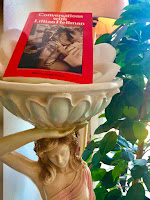“Days to Come” was first produced at the Vanderbilt Theatre, New York City, on December 15, 1936.
In the middle of the Great Depression, the workers are striking against the factory owner Andrew Rodman in small Ohio town. His wife Julie told him he should set that right but he rejected.
Julie: ……We haven’t talked about it much. I knew you didn’t want to. But the strike, these people here-it’s wrong for you. I know it’s so wrong for you. Settle it now. It doesn’t make any difference who wins-
Andrew: (sharply) I don’t care who wins. If it were that simple, it would be fine. But it isn’t that simple. I can’t fit the pieces together…….I’ve only loved two things in my whole life: you and this town…….This was my home, these were my people, I didn’t want much else. But that’s been changed, I don’t know how. And I don’t know where I stand any more.” - from Act One
Leo Whalen, the labor organizer was sent to teach the strikers about non-violent methods to achieve victory in their labor struggles. However, before Andrew can understand what to do, the town was engulfed by violences and disasters.
Labor strikes as a background, there are many other subjects in "Days to Come." Julie Rodman is always trying to find out about herself. She visited Leo Whalen at night, wanting him to show/teach her the way and go away with her. Andrew's best friend Henry Ellicott, a investor of the factory business, seems to love Julie.
Ellicott: "And that's where I've got to quit." There isn't a man living who doesn't know about the woman who allows herself anything, but who invents the one rule that will keep her this side of what she thinks is respectable. She'll lie, but not on Thursday. She'll sleep with you, but not immediately after lunch. Usually, it's funny. In your case, for me, it's not so funny. (Angrily) What the hell did you expect me to mean to you?
Julie: (puts her hand on his arm) What did I expect you to mean to me? I don't know. I haven't any excuse, really. I've hoped for a very long time that everybody or anybody would mean something. (Smiles) Things start as hopes and end up as habits. ......"- from Act One
Rodman family lived quiet and polite in this small town with the people who know everything about each other and share secrets. "Polite and blind" they tried to live. In the end, Rodman family started to talk the truth hidden in their mind for a long time.
Julie: ...Darling, I told you the truth. I wasn't in love with you when we were married. I am not in love with you now. But I love you. Not the way I want to. But another way. More than anybody I've ever known.
Andrew: ...I know what you mean. You have done nothing to me.
Cora: No? That's a strange way of looking at it. Done nothing to you. She's broken you, that's what she's done. She's why you owe money- to Henry and to everybody else, She's why-
Ellicott: (violently) Is that your business, too?
Cora: No, thank you. It's not my money he's lost. But you needn't think I didn't know. I knew where it was going. The year her family lost their money and how her mother had to have the best doctors and how her brother had to go to Paris to study, and how she always had to have trips and clothes, and a year in Europe to make her happy. Thousands and thousands he had to borrow for it-
Julie: (suddenly, her voice hysterical) I didn't know that. I swear I didn't. We always had so much. Why didn't you tell me?
Andrew: It wasn't your business. It isn't now. I wanted it that way. I suppose, underneath, I always knew. I wanted to keep you. That was my way of trying.You had nothing to do with it. Nothing at all.
“It’s the family I’m interested in principally; the strike and social manifestations are just backgrounds. It’s a story of innocent people on both sides who are drawn into conflict and events far beyond their comprehension. It’s the saga of a man who started something he cannot stop…”
-from “An Adult’s Hour is Miss Hellman’s Next Effort” by Lucius Beebe/1936, “Conversations with Lillian Hellman” edited by Jackson R. Bryer
“Days to Come” was a commercial failure, closed after a brief run of seven performances. Lillian described in “Pentimento” that her guilt for the failure lasted for many years and she needed two years before writing another play “The Little Foxes”. However, it still deserves to watch and read.




